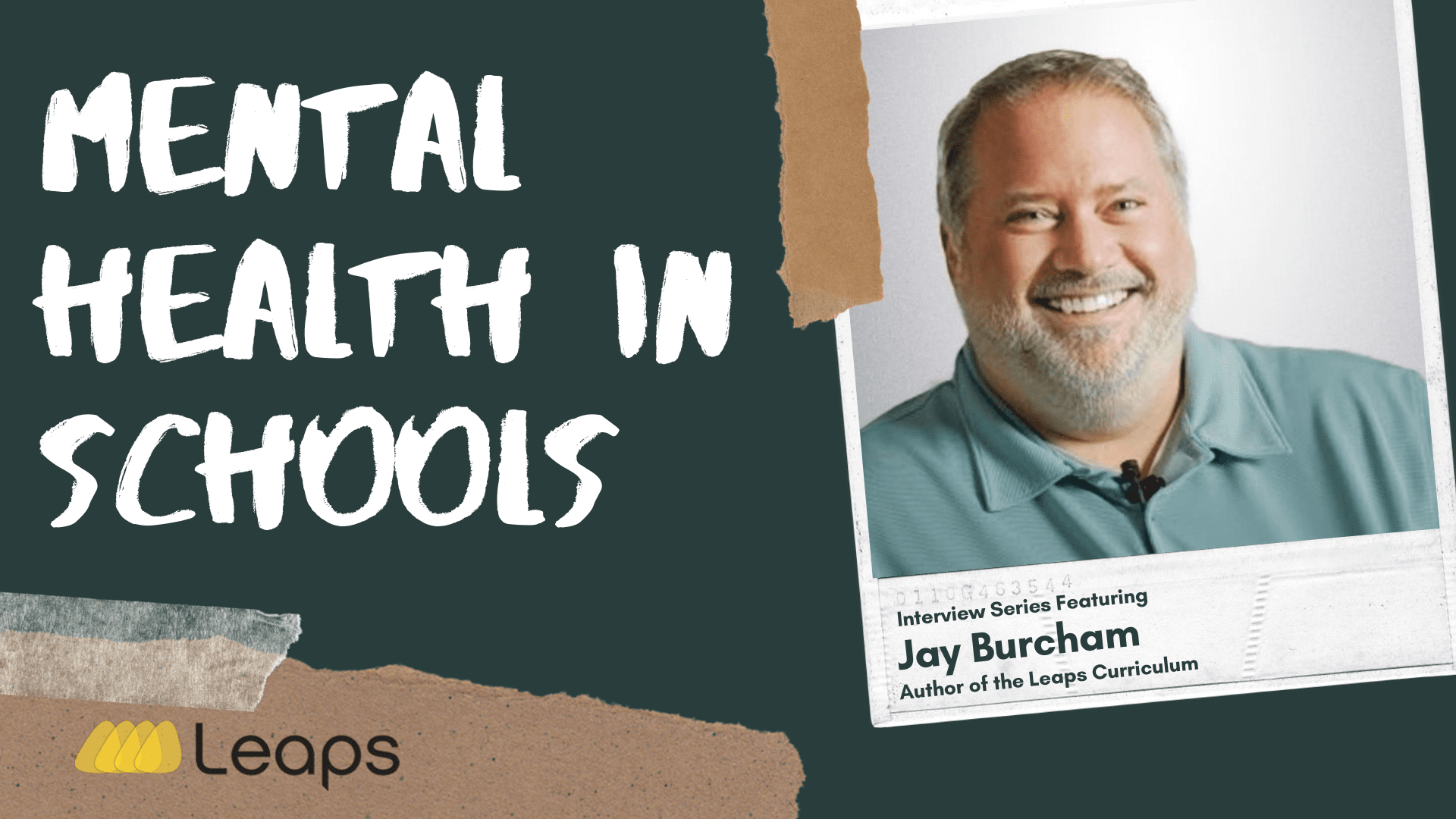Mental Health for Schools
Leaps is helping schools teach kids what matters most.
Quick Links
Take a Virtual Tour
A short walk thru video of the Leaps system
Classroom Stories
See how other schools are using Leaps
Mental Health Glossary
We all need to get on the same page
On-Demand Webinar: Understanding Mental Health in Schools
Leaps helps teachers manage classroom challenges and can help identify students that may need individual assistance or professional intervention →
It’s Time We All Get On The Same Page
Our nation’s schools have many responsibilities. Aside from the obvious responsibility of educating students at a globally competitive level – our schools now find themselves in the position of developing student’s character, teaching social and emotional skills, and even being the frontline of identifying mental illness and supporting mental health. The tragedies of school shootings coupled with the spotlight of the shrinking societal and community boundaries that distance previously afforded has thrust mental health into the forefront of the educational conversation.
So now our educators need to be versed in the preventative processes of mental health and the intervening processes of mental illness. This lofty task is being made even more difficult by the conflation of mental health with serious mental illness and behavioral disorders and developmental processes.Â
years of research
Schools are using leaps
Helpful Articles & Information
Mental Health Glossary for School Districts
We’ve put together a simple glossary of terms about mental health because today, more than ever before, we all need to be speaking the same language around this critical range of topics.
Calming That One Student
Why is it harder to calm one student down than to calm an entire class? Why does it seem there is a butting of heads and a clash of wills more in a one-on-one situation than when telling the entire group to sit down and pay attention?
Teacher Burnout Deserves Attention
Teachers are leaving the profession they love, because they’re worn out, stressed and often lack access to tools that can really help to improve school culture for everyone – students, teachers and administrators.
We’ve Been Studying Mental Health in Schools for 30 Years
Leaps is an evidence-based system. We need messaging here that explains how we started and touch on psychosocial, behavior support, and all the rest of it in a little snippet. I need help writing this.
Frequently Asked Questions
Are you looking for more clinical data? We’ve been studying psychosocial skills training for 30+ years in a clinical setting. Please take a look at our case studies for a deeper dive.
Is Leaps compatible with CASEL?
Yes, and then some. The Collaborative for Academic, Social, and Emotional Learning (CASEL) outlines five core competencies of social and emotional learning (SEL). Each one is defined by a number of abilities necessary to achieve that competency. Leaps incorporates all of the five core competiencies of CASEL and goes beyond that framework to add significantly more essential skills, called psychosocial skills, for students that are growing and maturing, to help them learn to manage more complex issues as they grow up.  Learn More
What does psychosocial mean?
Psychosocial refers to a person’s psychological profile and includes their behavior and responses to stress and other situations. It also includes consideration for their surrounding social environment and its impact on their physical, psychological and mental wellness as well as their ability to function in a social setting – whether that is a work, in school or any other social situation.
Why does Leaps focus on psychosocial as part of addressing mental illness?
More people are affected with psychosocial struggles than with serious mental illness. In fact, all people will need to deal with and learn from various psychosocial skills at some point throughout their lives. With physical health, it is all very measurable. We can look at body temperature, vital signs, physical stuff. With mental health, things are more subjective and less physically measurable. Psychosocial is just one of many components clinicians look at when someone is dealing with social or behavioral difficulties. Having trouble with friends or in class can be a sign of clinical concern, like the possibility of depression, but it also might be a much simpler issue, solved with basic psychosocial skills training. A person exhibiting some of the signs of depression is not automatically diagnosed as clinically depressed. There are behaviors and strategies that we can all benefit from learning, to help us manage various triggers in our environment, like in a classroom or at home. Learning these important life skills can help us recognize and better deal with stressors and triggers,without the need for formal, clinical intervention.
How does learning psychosocial skills help students in life?
Psychosocial skills are important for anyone that wants to have fulfilling relationships and to manage some of the basic things of value in life. People with good psychosocial skills are better at making and keeping friends. These skills help you not just get a job, but keep a job. They are critical skills for managing all kind of relationships with other people – including teachers, colleagues, people in authority like a boss or mentor and eventually, with a life partner and children. Families and parents with good psychosocial skills are more likely to enjoy each others company, take good care of each other and have more productive, fulfilling lives.
How does this fit at school? Isn't this better for parents to teach these things at home?
The answer here is two-fold. First, of course it is important for parents to teach their children good psychosocial skills. Leaps supports and encourages parents to be as involved as they can be and we provide special at-home lesson materials for teachers to empower and engage parents. It is great when a teacher and parents are on the same page and can provide consistency for students. Second, at school, teachers are spending many hours a day in close interaction with students. Teachers are managing classroom behavior and working to equip their students for life after school. Leaps lessons help in that classroom, improving behavior, test scores, attendance and school culture. Teachers using Leaps get better results in class and their students take away lasting, impactful lessons for a better future.Â




